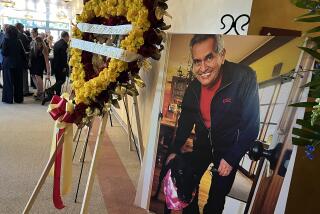City Probing Alatorre on Fund Use in Council Bid
- Share via
The Los Angeles city attorney’s office is investigating whether Councilman Richard Alatorre violated the city’s campaign contribution law by using about $45,000 of his state campaign funds to finance his City Council campaign.
Mike Qualls, a spokesman for the city attorney’s office, said Tuesday that the office is conducting an inquiry, but he would not discuss the amount in question. Other sources said the amount being questioned is $45,345 that was spent last year before former Assemblyman Alatorre was an official candidate to replace Councilman Arthur K. Snyder, but several months after Alatorre announced his intention to run and began laying the groundwork for his council campaign.
The city campaign contribution law passed by voters last year and put into effect July 1 basically limits campaign contributions to $500 for City Council candidates. Other provisions prohibit a council candidate from using outside sources, such as a state committee, to finance a city race.
Violation of the law is a misdemeanor and occurs if a person “knowingly and willfully” skirts the law. Conviction by a court could make a person ineligible for city elective office for five years, although the law does not specifically address how to handle the conviction of a person already in office.
Under the law, Alatorre was prevented from using any money from his state campaign fund, Citizens for Alatorre, to finance his City Council campaign. The campaign contribution law was designed in part to lessen the fund-raising advantages of incumbents who could, before the law was passed, stockpile large sums for use in future city political races.
Alatorre’s campaign for the Eastside council seat, following the long-anticipated October resignation of Snyder, was in the first election to be held in the city after the passage of the campaign contribution law.
“It is a new law, and I’m the guinea pig. Naturally there’s a lot of scrutiny because (mine) was the first campaign under the new law,” Alatorre said. “I don’t have a problem with that, so long as people give me the correct information.”
He said that various lawyers in the city attorney’s office gave him “confusing advice” as to how he could use money in his state account. He said he could not remember which city lawyers he talked to. “I was a trial balloon,” he said.
Questions Raised
Investigators, who began the inquiry late last week after a Herald Examiner reporter raised questions about Alatorre’s campaign financing, apparently are questioning the legality of how campaign funds were used in a number of instances.
Included are a July $150-per-person Alatorre fund-raiser at the Pickfair home of Los Angeles Lakers owner Jerry Buss, for which nearly $21,000 was spent on catering, and $15,000 for videotaping that an Alatorre spokesman said was “autobiographical . . . about Richard’s background.” Later, the spokesman said, Alatorre’s voice was added, asking viewers to vote for him for councilman.
Another $5,000 was spent by the state committee on lawn signs reading “Alatorre” and another $3,750 on printing, and about $1,000 on printing, graphics and photos.
Alatorre said he already has reimbursed $25,000 to his state committee and said another $20,000 “is in the process” of being reimbursed. Although Alatorre said that “to my knowledge there have been no violations,” he decided to reimburse the money last month, he said, “because I didn’t want anything (mis)construed; I didn’t want anything under a cloud.”
Keeping Options Open
Alatorre said the expenditures by his state committee indicate that “I was keeping my options open. I let it be known I wanted to run for council, but there was no vacancy until Snyder resigned in October. I had to prepare for any eventuality, including running again for the Assembly or another office.”
City Hall sources said a decision from City Atty. James K. Hahn is expected in a few days. If the city attorney’s office determines that violations of the campaign law occurred, one knowledgeable City Hall source said, the case may be transferred to the district attorney’s office to avoid conflict-of-interest problems.
More to Read
Sign up for Essential California
The most important California stories and recommendations in your inbox every morning.
You may occasionally receive promotional content from the Los Angeles Times.













